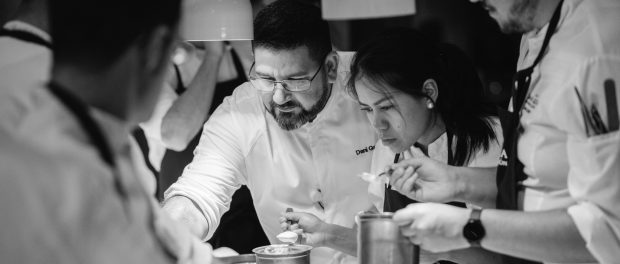
- Firstly, thank you for sharing your story, can you tell us more about your career and how you ended up in the hospitality industry?
As a child, I never dreamed of becoming a chef. My choice was unusual in a family that valued conventional professions. Despite the initial doubts of my parents and peers, my passion for cooking persisted. Fond memories of trips to markets and farms with my father sparked my interest in the restaurant industry. My journey into the culinary world began with learning from renowned chefs at an innovative school on the Costa del Sol. Immersed in haute cuisine and working in prestigious establishments honed my skills and defined my approach to cooking. Receiving a Michelin star was a seminal moment, marking the culmination of years of constant hard work and dedication.
- Throughout your career you have blended traditional Andalusian recipes with international influences – can you tell us a bit about your creative process when developing new dishes?
The creative process is hard work. I often admire people who can sit by the seaside, get inspired and create a dish from that contemplation. I think that’s really amazing. But that’s not the case for me. My process is more consistent and structured: working, gathering references, testing, revising. Only through this structured approach does the spark finally fly. Ultimately, you need to be organized. Depending on the concept you are working on, you think about the dishes you want. For example, if you want a fresh raw dish, you start by looking for Mediterranean ingredients such as sardines. From there, you think about how you can make this a memorable, fresh and shareable dish. There is no rigid structure and nothing is forced. Everything is very dynamic and always focused on the needs of each brand.
- With so many restaurants open across the world, how do you ensure consistency in quality and dining experience across all your locations, especially considering diverse cultural backgrounds?
It’s all about the team. There’s no other way. This isn’t a restaurant with my name on it, where I cook every day. This is a big company, and we put a lot of effort into finding competent team members that we can totally trust.
- You’ve explored a variety of culinary concepts, from Tragabuche to Lobito de Mar. How do you balance staying true to your culinary roots while adapting to evolving culinary trends and consumer preferences?
It’s probably something that comes naturally from your culture, where you were born and what you’ve been cooking your whole life. When we talk about lobito or tragabuche, it’s very simple, because we hardly change the traditional recipes. We just try to improve technically, but essentially it remains a traditional recipe. But with BiBo it’s different. For example, if we want to make ceviche, we adapt it to the place and use local ingredients.
Each concept has its own unique qualities: some are more local and traditional, deeply rooted in the culture, others are more international, and strive to use the best local products available in each destination.
- Your restaurant, Dani García Restaurant, was awarded three Michelin stars and received widespread acclaim. Can you talk about your transition from fine dining to more casual concepts like BiBo Andalusian Brasserie & Tapas, and how you have maintained excellence across different dining formats?
After receiving my third Michelin star, I made a conscious decision to focus on opening a restaurant that would target a wider audience. My vision was to create a welcoming space where everyone could feel at home, regardless of their background or appearance. Many people are intimidated by fine dining, thinking that it requires a certain attitude or dress code. A place like BiBo aims to dispel these notions and make customers feel relaxed and comfortable. We achieve this atmosphere through careful selection of furniture, lighting, music, and even scents.
- “Hacer de Comer” showcased your culinary expertise on television. How has media exposure influenced your approach to cooking and restaurant management?
It was an important year for us. The show showcased a new dimension for us and a new approach for the future. Although it was the year we received three Michelin stars, we didn’t want people to associate us only with fine dining. We wanted to broaden our perception beyond our work with liquid nitrogen to more global and traditional cuisine. This is one of the reasons why I agreed to appear on a Spanish TV show. It was a lot of fun and it’s an experience I would love to have again when the company is more established and strong. From now on, we will focus on communicating everything we do and our philosophy of bringing food closer to the people.
- With BiBo opening in Doha and other international locations, how do you adapt your dishes to suit local tastes while still maintaining the essence of Andalusian cuisine?
Each menu is specially tailored to the location. When you come to another country, you have to be flexible and adapt, even within the same country. Madrid is completely different from Marbella. We adapt everything to the location, taking into account the clientele, local ingredients and trends.
For example, people in Qatar have different eating habits than people in other parts of the world, where we have to cater to their needs and avoid cooking with alcohol. At Leña Dubai we don’t serve pork. Each new store opening has a different approach depending on the location, but always maintains the essence of each concept.
- Smoked Room introduced a unique concept with a focus on smoke and embers and within six months it had achieved two Michelin stars. What was the inspiration for this concept and how do you continue to push the boundaries of cuisine?
For us, smoke was a logical connection. The Smoked Room was born in Lenya and was literally born in it, so it was perfect for The Smoked Room to follow Lenya’s culinary traditions and cooking style, which is rooted in grilling but more closely connected to haute cuisine. This is something new for us, and it’s about gradually evolving and improving the brand. We don’t know how far we will go or if we will revolutionize even more, but our goal is to keep evolving our cuisine to meet our customers’ needs.
- Your restaurant group has expanded rapidly, opening locations in places as diverse as Ibiza, New York and Dubai. What factors do you consider when choosing a new location, and how do you ensure each one reflects the essence of the Dani Garcia Group?
We receive numerous offers every week from various locations across the globe and evaluate all of them keeping in mind the company’s goals.
Currently, we are focused on expanding Leña and Smoked Room to cities such as London, New York and Miami, where construction is already underway. We are also receiving various offers, mainly depending on the city, the situation and the partners involved. For example, the proposal in Mallorca came to us because it is an establishment we admire and respect, a family-run business, operating with Mandarin Oriental in a magical environment. There is no way we could turn down such an opportunity.
- Looking ahead, what are your goals for the future of Dani Garcia Group, both in terms of culinary innovation and global expansion?
Our goal is to take the Leña brand global. As mentioned before, our next steps include Miami, where we already have a project underway, and we’re actively looking for stores in London and New York. We’ll be opening in Barcelona soon, and we’d love to take the brand to places like Ibiza and Morocco. There are so many places we want to expand to, and we plan to keep growing.







